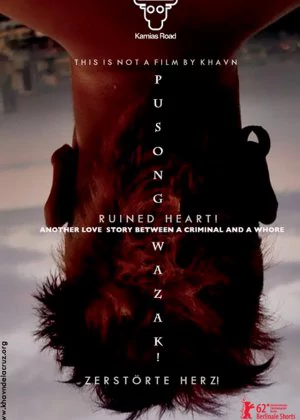Ruined Heart
Film distributors are often anonymous companies. But spend some time in the darker niches of cinema and you'll find that some labels are more than just money-grabbing institutions. When it comes to releasing Asian films in the West, Third Window Films is one of the prime labels out there. Point in case one of their latest releases: Khavn's Ruined Heart: Another Love Story Between a Criminal and a Whore [Pusong Wazak!]. A film that would've passed me by completely if it wasn't for the TWF marker. It's the sole reason I picked it up, and boy am I glad I did.
![screen capture of Ruined Heart: Another Lovestory Between a Criminal & a Whore [Pusong Wazak!]](/thumbs/img/articles/1200xauto/ruined-heart-1.webp)
Considered by many to be "the father of Philippine digital filmmaking", Khavn (De La Cruz) is a pretty unique persona. In less than 20 years time he produced a filmography of over 150 films (that's features and shorts combined). Ruined Heart is enigmatically introduced as "this is not a Khavn film" and besides directing films Khavn is also a singer, pianist, poet and festival director. He's a man with a clear vision, that much should be obvious. Not everyone will enjoy what he does and stands for, but those who do are in for a spectacular ride. At least, if Ruined Heart is somewhat representative for Khavn's whole oeuvre.
Ruined Heart is not the easiest film to introduce. It's a Pan-Asian endeavor listing Tadanobu Asano and Christopher Doyle, so there is a weak link with Pen-ek Ratanaruang's most lauded films (Invisible Waves and Last Life in the Universe). But the film itself feels more related to Sogo Ishii's punk cinema (think Dead End Run), drifting on more free-form structures, ignoring narrative coherence and drawing fiercely from its soundtrack. It's punk cinema, but without the raging guitars.
There is a something in the way of a plot of course, concerning a crime boss, a lowlife criminal working for him and two women who drive a wedge between the two men, but specifics remain rather vague. Bits and pieces are thrown around, yet piecing everything together is no easy task. If you want you can read up afterwards, but that would be missing the true appeal of Ruined Heart. In the end it's not so much about what happens, but what is shown and how it is shown.
![screen capture of Ruined Heart: Another Lovestory Between a Criminal & a Whore [Pusong Wazak!]](/thumbs/img/articles/1200xauto/ruined-heart-2.webp)
Khavn is someone who prefers to work quickly, capturing the energy of the moment. At first, I was a bit worried this approach wouldn't go too well with Doyle's cinematography, but the result is entrancing. The camera work is agile and free, but at the same time there are some great camera angles and strong, powerful use of color. The film looks energetic and true to its punk roots, but with definite traces or Doyle's softer, more elegant cinematography running throughout. Add the sharp and snappy editing and the result is a film that feels both fresh and classy at the same time.
I described the film as Pan-Asian before, but Khavn's reaches stretch further than just Asia. The film is scored by Stereo Total (a German electropop collective) giving the film a very distinct atmosphere. The score was written with the support of Khavn himself and it permeates every single pore of the film. Some go as far as to call it a musical/punk opera, but scores are typically very present in punk cinema so it kind of comes with the territory. That said, while it's not exactly my kind of music it adds plenty to the film, making it an ever bigger melting pot than it already was.
Even more evidence of the film's global influences is found in the addition of Nathalia Acevedo (Post Tenebras Lux). Together with Tadanobu Asano and Elena Kazan she forms the central trio of the film. It was particularly nice to see Asano get into the role of flamboyant anti-hero once again. He hasn't lost much of his former presence, and he's still an ideal choice to play this type of character. It just goes to show what shame it is that Japan currently lacks similar opportunities like these, because it won't be too long before Asano will be too old to play these characters convincingly.
![screen capture of Ruined Heart: Another Lovestory Between a Criminal & a Whore [Pusong Wazak!]](/thumbs/img/articles/1200xauto/ruined-heart-3.webp)
Ruined Heart is only 73 minutes long, but it has the potential to be a true test of patience for those who don't feel it. It's less a narrative journey than it is cinematic poetry and those kinds of films are known to sharply divide audiences. Sadly there aren't enough of these films around, which makes it all the more important that distributors like Third Window Films give them the attention they deserve. Khavn clearly has talent and with the people he gathered around him for this project the quality only rose exponentially.
If you like cultural melting pots, non-narrative cinema, punk cinema or just something off-kilter and youthful, then give this a try. It's one of the best cinematic experiences I've had so far this year and I would be pretty surprised if it wouldn't make my end of year list. I can't vouch for Khavn's other films, but as far as this one goes it's a true joy to behold. Kudos to Third Window Films for unearthing this little gem, it's a film I wouldn't have wanted to miss out on.
